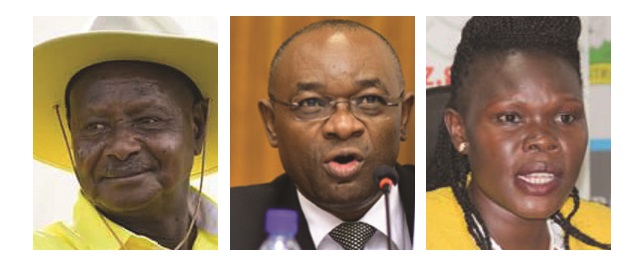
Oulanyah versus Kadaga
Reasons for the turnabout remain unclear. According to one version, offered by the Deputy Speaker Jacob Oulanyah, the Office of the Speaker of Parliament had not received Magyezi’s motion. Oulanyah, observers say, was playing his own little tussle with Speaker Rebecca Kadaga. According to this script, Oulanyah is this time determined not to be Museveni’s delivery boy for lifting the age-limit. Oulanyah reportedly understands the real consequences of tampering with the constitution. When he was still a member of the opposition Uganda Peoples Congress (UPC) party in 2005, he chaired the Legal and Parliamentary committee, whose report recommended the lifting of term limits. In the election the following year, he lost his Omoro seat. He wants Kadaga to do the heavy lifting but she was proving to be as slippery as an eel. So Oulanyah was possibly happy to postpone business on the Bill until Kadaga who claimed she needed time to internalise it, was ready.
It was also rumoured that Kadaga was knocking her head on the wall trying to wiggle out of two other conundrums posed by the age-limit debate. The first was a bid to maintain consistency in her ruling. She appeared cornered because the Bill to lift the presidential age-limit is similar in ambition to one tabled earlier by another MP – to remove the age-limit on judges. Kadaga ruled that it could wait for a comprehensive constitutional reform Bill by the government. Could she rule the same now?
Secondly, she was faced with a raft of other constitutional amendments. MPs Patrick Nsamba Oshabe (Kassanda North) and Workers’ MP Sam Lyomoki want to move motions of their own. Nsamba wants government to urgently constitute the long-awaited Constitutional Review Commission.
While Lyomoki wants to reinstate term limits and also guarantees for President Museveni that he won’t be prosecuted. One of Lyomoki’s bills is called “The Museveni Succession, Transition and Immunities bill, 2017”.
While Lyomoki claims he is motivated by the desire to ensure smooth transition of power, NRM critics see his moves and those of other legislators as intended to attract the attention of President Museveni by appearing to frustrate Magyezi’s.
In this endeavor, Lyomoki and Nsamba are not alone. Several other legislators are planning motions to overwhelm parliament and possibly force concessions out of President Museveni.
By press time, two other legislators were planning to put in motions. One of the bills was aimed at scrapping the constitutional provisions on minimum academic requirements for all elective positions in the country and the other to force MPs appointed to cabinet to first resign their parliamentary seats. The pusher for the latter, legislator John Baptist Nambeshe said his intention is to fully apply the concept of separation of powers and put an end to situations like Magyezi’s proposal enjoying unfettered support from ministers. So how was Kadaga to allow one Private Members Bill – to lift the age limit – and block the others?
Oulanyah who was familiar with the minefields, dodged one with a subtle but significant technicality. He said while Magyezi had submitted a `notice for the motion’, he had not submitted the motion itself. With that he adjourned the House and Magyezi’s dream of fortune was bruised – but not apparently, punctured.
It is a point David Mafabi, who is President’s Museveni’s Private Secretary for Political Affairs and one of the key architects of the campaign to lift the age limit emphasised to The Independent after the debacle.
He said the main issue is not how often we should change presidents but how we should ensure survival and forward movement as a country.
“Age limit is a smaller aspect of that in the context of Uganda,” he said, “Globally there is no jurisdiction that has an upper age limit. It is an aberration. It shouldn’t have been part of the constitution. There should be no illusion, the mobilisation will continue; the age limit will be lifted.”
“The skirmishes in parliament are a temporary phenomenon,” he said, “The constitution will be amended.
“Article 102 (b) will be lifted. The details are another matter. The struggle to lift the term limits will be victorious.”
In reality, Museveni’s camp has suffered two major public relations disasters. After years of telling the world that he was president because of the peoples mandate, President Museveni who was playing on the global stage when the first age-limit scuffles erupted in parliament (with other world leaders at the annual UN general conference in New York, USA), must have been frustrated about the ugly scenes making headlines on BBC and CNN from back home: that he had deployed the army around parliament in a bid to force through the lifting of the age limit.
The other international stories coming out of Kampala must have been equally frustrating for Museveni that morning; that up to 21 women, one-at-a time- had been murdered over three months without the killer/s being caught, that a new rebel-group was claiming to have sprung up to fight him, and that the Ugandan economy was in a shambles. Museveni’s closest aides, the clergy, civil society, and academics, have either counseled caution or out rightly told Museveni – “it is time to start packing”. So how did Museveni get to this low point; when he appears swallowed up in one crisis after the other?
 The Independent Uganda: You get the Truth we Pay the Price
The Independent Uganda: You get the Truth we Pay the Price




This is a informative post.I had never seen like this post.I learn many think about law.